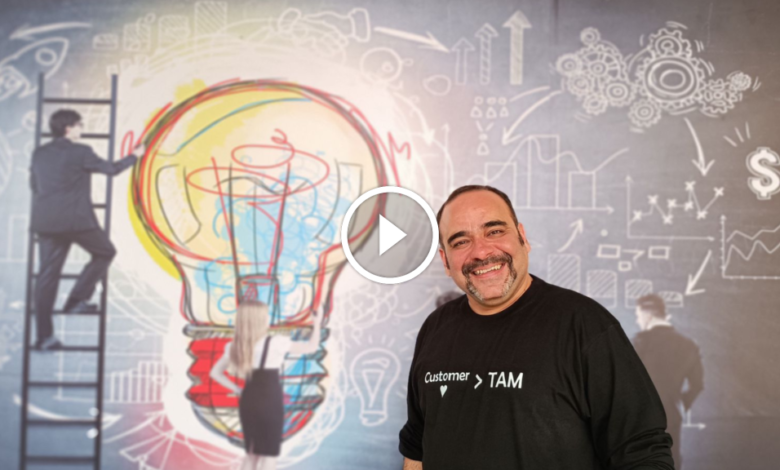Entrepreneurship
5 Insights Seasoned Consultant Challenges

A Candid Conversation with Aneesh Khanna, Early Stage Start-up Coach & Consultant
Entrepreneurship is a dynamic and challenging journey that requires guidance and mentorship to navigate successfully. Aneesh Khanna, a seasoned entrepreneurship consultant and coach, shares his motivations for transitioning from corporate roles to mentoring startups. Through this in-depth interview, we explore his insights on overcoming early challenges, the impact of technological advancements, and his unique strategies for helping early-stage entrepreneurs thrive.
Journey to Entrepreneurship Consulting: What motivated you to shift from your corporate roles to becoming an entrepreneurship consultant and coach?
Even when I speak with Early-Stage Entrepreneurs, I make them document their motivations to startup. In this process, I usually get them to group them into 2 categories. First, their Sources of irritation and then their Motivations.
My source of irritation as a corporate professional, in the Healthcare Industry, stemmed from the fact that the customer was never ‘put first.’ The patient had always got to be Patient. This was a constant ‘source of irritation’ for me. There were so many things wrong, about how the service of ‘Home Healthcare’ was being delivered by the big companies. It made me believe that whatever a big company does, a small company can do better.
My motivation was my calling to set up my own Enterprise where all employees worked hard and passionately towards ‘Serving the Customer’ by keeping him/her at the center of the business. My startup in 2010, was one of the pioneering companies in the home healthcare space, much before it became an acceptable offering.
When it comes to Entrepreneurship Coaching and Consulting, I was naturally drawn towards it, because I felt morally responsible, to pass on the learnings to help aspiring entrepreneurs, so that they do not make the same mistakes that I had made, and to see them blossom into thriving startups. I also saw Entrepreneurship becoming a career choice for many young aspiring entrepreneurs, with no existing playbook and very little formal education available to first time Entrepreneurs.
Early Challenges: Reflecting on your initial days in consulting, what were some unforeseen challenges you faced in mentoring early-stage startups, and how did you overcome them?
John C Crosby said that “Mentoring is a brain to pick, an ear to listen and a push in the right direction”. A Mentor, Coach or Consultant has to maintain a fine balance of giving advice, while retaining the authenticity of the Founder and the Startup. I have been guilty in trying to get the entrepreneur to follow the steps exactly as given by the Coach; this does not work. You have to show the path and then let the Entrepreneur make a decision. At the end of the day, it is them who will decide the destiny of their startup.
First time Entrepreneurs are not used to failure and rejection. In the early days, I often kept giving ideas, one after another, some failed and then I expected the entrepreneur to get up and try the next one immediately. This strategy didn’t necessarily work that well. As a Coach, you must realize that your own journey may have been ridden by potholes and obstacles, but for the Entrepreneur, each small failure can be crushing in the early days. Being empathic to that emotion, is very important as a Coach/Consultant.
About ‘Ain’t No Eureka’: Could you walk us through the genesis of your book ‘Ain’t No Eureka – The Idea to Enterprise Journey’ and how it aims to bridge gaps in the current startup ecosystem?
In the last two years in particular, I observed how a combination of ‘Startup India’ efforts and the ‘Shark Tank Phenomenon’ have created a sea of aspiring Entrepreneurs. Entrepreneurship has become a career choice for many. However, unlike Engineering or Management, where your 1st job taught you so much, even if you slept through your degree program; ‘Starting up’ can be very different. I wrote the book thinking about people who roam with an IDEA in their POCKET. Keen to speak to someone, who will validate their idea for them and answer all the multiple questions in their head. At this point of the time, the aspiring entrepreneur can see some podcasts, maybe enrol for a startup course by a content creator. But Someone’s ‘rags to unicorn startup story’, doesn’t help an entrepreneur validate his own idea.
The book is written in a way, such that each chapter of the book, peels the layer of the IDEA, step by step. The book also serves as a workbook, where the reader commits to journaling their thoughts on topics like ‘Motivation to Starting up, Idea Validation, Competition Analysis, MOAT, Product Market Fit, Minimum Viable Product, Fundraising’ and a lot more. I think of the book as a GPS for an Aspiring or Early-Stage Entrepreneur.
Workshop Impact: How do your ‘Idea Validation’ workshops complement the lessons from your book, and what key takeaways do participants typically leave with?
The workshops on Idea Validation, mirror the mission of the book, ‘Ain’t No Eureka – Your Idea to Enterprise Journey’. Entrepreneurship is a lonely journey and so are the initial days where you just have the seed of the idea in your mind. The workshops are a support system to help germinate that idea.
I conduct these workshops both as open formats and also within Management and Engineering colleges. I run open workshops twice a month in Mumbai, where a small group of 10-12 aspiring entrepreneurs come and share their ideas.
The workshops are a safe place, where we don’t judge any idea, but rather help the aspiring entrepreneur to peel the layers of his idea, through multiple sessions on Idea Validation, such as:
- Defining your Idea and its Motivation
- Describing the WHAT, HOW AND WHY. Based on Simon Sinek’s golden Circle.
- Competition Analysis through a 2X2 competition matrix
- Understanding MOAT
- Building Consumer Personas
- Basics of Fundraising
- PMF and MVP
Advising Techniques: What are some unique strategies you use in your consulting practice to help startups navigate the turbulent waters of early-stage business development?
Scaling the Customer Love – Early-Stage Business Development, cannot be about Performance Marketing. You have to find the customers who would love what you are building. I work with entrepreneurs to help them understand their customer cohort, their early adopters better. The secret sauce is to replicate that love to increase the business TAM (Total Addressable Market), even if it was small in the early days. This also involves creation of Consumer Personas, based on demographic, psychographic, geographical and technographic factors
Move the Needle – First time Entrepreneurship can be very lonely and often times overwhelming. When the entrepreneur blanks out, after a few early rejections, I often tell them to find something, however small it is, to move the needle and move forward. Like Virat said recently, can we make a 1% opportunity into 10%.
Come back to your WHY and the Problem – When in doubt, it is my duty to steer the entrepreneur back to his WHY, the cause, belief or purpose, on account of which he started his/her journey. To remind them of that moment and ensure that they are still committed to that original WHY. The other aspect, is to keep obsessing about the actual problem area, rather than thinking about new features of the solution.
Keep Iterating for success – While building the product, I ensure that customer feedback is sought at every stage, so that they can be incorporated into improving the product through continuous iterations. Eric Ries’ Lean Startup methodology states that being in ‘stealth mode and doing secret beta testing’ is obsolete. Customer feedback matters more than secrecy and that yields better results, through building an MVP(Minimum Viable Product) and then revising it through multiple iterations.
Technology Integration: In what ways have technological advancements influenced your coaching methods or the advice you provide to startups?
Coaching Methods:
Everyone across the country is a video call away, that definitely creates more access for both the Coach and Coachee
I use a Notion board for some engagements, where we can track the week-on-week progress of the startup, along with deliverables from both sides
Technology Advice:
Building a tech MVP is always a challenge in the bootstrapped phase, particularly if the starting co-founding team are non-technology folks. This requires some handholding in being prudent on the tech development investment in the MVP, so as to not make it feature heavy
As cliched as it may sound, thinking of AI is important. How AI can be integrated in the business model and if AI would threaten the longevity of the Startup
Diversity and Reach: You aim to impact a wide range of entrepreneurs across different regions and sectors. How do you tailor your approach to meet such diverse needs?
In the India of today, we are Digitally Equal, but Economically Different. I think early-stage entrepreneurship also mirrors this sentiment. All entrepreneurs have access to startup news, podcasts, linkedin posts etc, but the quality of mentoring, access to capital, investment banking advice etc is radically different. I think access is more important than tailoring. The coaching approach doesn’t necessarily need to be modified. Tier 2/3 early-stage entrepreneurs need more access to accurate advice and external capital.
- To allow access I am creating some interaction opportunities through my website www.aneeshkhanna.com, which goes live shortly. The website allows aspiring entrepreneurs to connect with me through:
- 1: 1 calls to discuss their idea
- Enrolment into the upcoming free workshops
- A Paid 8 week Mentoring Bootcamp, where every week, we have a call in small groups and discuss one unique aspect of Starting up. Homework is given, which includes secondary research, speaking with potential users, competition analysis etc, which has to be done before the next call, to move the needle forward.
Future Vision: Looking forward, what are some emerging trends you believe will significantly impact early-stage entrepreneurship in the next five years?
It is clear that early-stage fundraising is a challenge today, despite the exuberance and more young people getting into Entrepreneurship. Early-stage capital should ideally allow you to find your MVP and your Product Market Fit. But unfortunately, in the current times, MVP and PMF are both asked for during an early stage funding round. So, Entrepreneurs have to be resilient, innovative, look at small capital from Friends/ Families/ Grants/ Government Schemes etc, before they look at their first round of capital
Quick commerce faced a lot of criticism in 2022 and early 2023, over the merit and need for a 10-minute delivery, but today Quick Commerce is a threat to ecommerce and marketplaces. So, if you are building in the D2C or Consumer space, you must think of Quick Commerce first. Brands like Go Zero, Bombay Shaving Company, Go Desi and so many others, have benefitted tremendously by quick commerce. On account of the popularity, listing on Quick Commerce has also become a challenge today for small consumer brands.
AI – Seems like an abused trend, but it is a reality. While building your startup, you must think of how AI will add value but also, if AI can threaten the longevity of your business
Personal Insight: After years of guiding others, what has been the most rewarding aspect of your journey, and what keeps you motivated?
‘Find what feels like PLAY FOR YOU, but looks like WORK FOR OTHERS’. This is my Entrepreneurship Motto. When I work on a new IDEA, with someone who has that glint in their eye, it feels like PLAY. This doesn’t imply that it is easy or fun, it just means that there is a crazy inquisitive joy in that mentoring & coaching engagement.
The most rewarding aspect of my role, is being able to get the mentee to move the needle on many fronts in the early stages. For Example, I had a new mentee who was looking at building an aggregator platform and was excited after speaking with 15-20 people, to whom he described the mobile application, the solution. I asked him to take a step back and instead talk to at least 50 people, about the problem that he was solving, hear their current consumer behaviour and find the pain areas and the friction points. When such advice helps the entrepreneur take a step back and see another aspect of their business, it is a very rewarding experience.
Advice for Aspiring Entrepreneurs: For someone just starting their entrepreneurial journey, what would be your top piece of advice?
- Spend more time thinking about the Problem rather than shaping the solution
- Stay Authentic to your WHY and the underlining reason why you want to solve a specific problem (It can’t be to make money, that’s an outcome 😊)
- Chase Sales and not fundraising on Day 1
- Dream Big but keep taking small steps. Success is not the opposite of Failure, in fact Failure is a requirement or precursor to a grand Success



